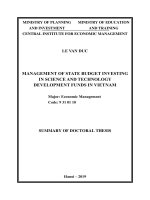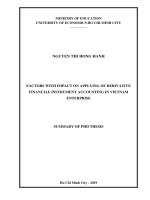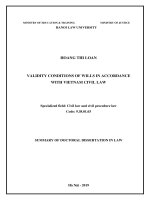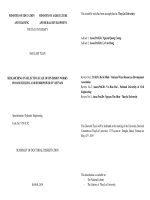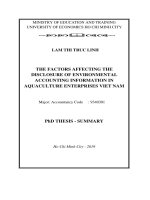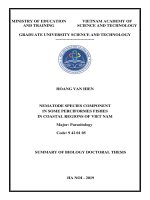Thành phần loài giun tròn (nematoda) ký sinh ở một số loài cá thuộc bộ cá vược (perciformes) ở biển ven bờ việt nam tt tiếng anh
Bạn đang xem bản rút gọn của tài liệu. Xem và tải ngay bản đầy đủ của tài liệu tại đây (904.23 KB, 27 trang )
MINISTRY OF EDUCATION
AND TRAINING
VIETNAM ACADEMY OF
SCIENCE AND TECHNOLOGY
GRADUATE UNIVERSITY SCIENCE AND TECHNOLOGY
----------------------------
HOANG VAN HIEN
NEMATODE SPECIES COMPONENT
IN SOME PERCIFORMES FISHES
IN COASTAL REGIONS OF VIET NAM
Major: Parasitology
Code: 9 42 01 05
SUMMARY OF BIOLOGY DOCTORAL THESIS
HA NOI - 2019
The thesis is completed at:
GRADUATE UNIVERSITY SCIENCE AND TECHNOLOGY
VIETNAM ACADEMI OF SCIENCE AND TECHNOLOGY
Supervisors:
1: Ass. Prof. Dr. Ha Duy Ngo
2: Dr. Nguyen Van Duc
Reviewer 1:........................................................................
...........................................................................................
Reviewer 2:........................................................................
...........................................................................................
Reviewer 3:........................................................................
...........................................................................................
The dorteral thesis will be defended at the Evaluation Committee of:
GRADUATE UNIVERSITY SCIENCE AND TECHNOLOGY
Time: Date......month.......2019
The thesis can be found at:
- The library of Graduate University Science and Technology
- National Library of Vietnam
INTRODUCTION
1. THE THESIS NECESSARY
The risks of fish parasites, especially nematodes, to human
and animal health constitute are an important problems. The
infections are not only caused health deficiency or disability of
humans and animals but also reduce productivity and
profitability of aquacultute, increase economic burden due to
the costs for disease treatment and prevention. Although
parasitic deseases caused many harmfulness, they have received
little attention from scientists, managements.
Our study of the composition of the parasitic nematodes in
marine fishes in the off Vietnam is urgently needed. The
survey’s results are not only provide the information about the
fauna of fish’s nematoda, the relation between hosts-parasites,
but also assess the the potential risks for human consumption.
2. OBJECTIVES
To have the knowleadge of the nematode fauna from
Perciformes fishes in the sea off Vietnam.
3. THE RESEARCH CONTENTS
* To study and build the systematic of nematode fauna from
Perciformes fishes in the off Vietnam.
* To describe the morphological features of some selected
nematode species.
* To know the current status of nematode infections
(prevalence, intensity of infection) in some Perciformes fish
species (Perciformes) in the off Vietnam.
1
4. THE SCIENTIFIC AND PRACTICE SIGNIFICANCE
OF THE THESIS
- Providing the composition and the distribution of the
parasitic nematodes from Perciformes fishes in the off
Vietnam,, including a new records of host species. Especially,,
19 nematode species were found and described for the first time
in Vietnam.
- Providing the morphological data (measurement, drawings
and images, classification system) of all nematode species
which were collected in this study.
- Contributing the data of parasitic nematodes for the book
"Fauna of Vietnam: Parasitic roundworm in Vietnamese marine
fishes" later.
5. THE THESIS STRUCTURE
The thesis consists of 150 pages, in which: Introduction
2 pages; Literature review 20 pages; Materials and research
methods 13 pages; Results and Discussions 104 pages;
Conclusion and Suggestions 1 page. The published works,
which are related to the thesis 1 page; References 9 pages,
include 13 documents in Vietnamese and 81 documents in the
foreign languages. The thesis has 11 tables, 47 figures and
illustrations, diagrams and 16 appendix pages.
I. Chapter 1. OVERVIEW
1.1. Basic characters of parasitic nematodes: General
morphological features, biological characters, life cycle of
nematodes, the distribution and harmfull effects of nematodes
were provided.
2
1.2. Summary of the parasitic roundworm classification
system: The outline of the nematode classification system in
the World and Vietnam were summarized.
1.3. Some basic characters of the Vietnamese marine fish
fauna, including the Perciformes order: General characters of
marine fish fauna in Vietnam, especially fishes belong to
Perciformes order were mentioned.
1.4. The studying situation of parasitic nematodes in marine
fishes.
1.4.1. Research on parasitic nematodes in marine fishes in
the Western Pacific region
Research on parasitic helminths in marine animals has been
conducted since the late 19th century, but it was received more
attention by scientists from the miStole of the 20th century.
Particularly, the data of nematode fauna from the Western
Pacific region has been avaiable about three late decades.
Wu (1927) had the first report of parasitic nematode from
marine fish in the off China, the author described one nematode
species
Paraleptus
scyllii
from
sharkes
Chiloscyllium
plagiosum in Taiwan sea . Up to 1965, Chinese scientists
continued to investigate the parasite fauna from marine fishesin
this region. In 2011, Peng et al. listed a total of 90 species of
nematodes
belonging
to
31
genera,
13
families,
9
supperfamilies, 3 orders and 2 subclasses in marine fishes in
China. However, this list already included all species (19
nematode spcies) which were found by scientists from Vietnam
and the former Soviet Union in the East Sea of Vietnam (South
China Sea).
3
Arthur et al. (1997) listed 201 parasitic species in Philippine
fishes, including 20 species of nematoda. In this list has
presented of Capillaria philippinensis, which can infecting to
human.
In Thailand, Purivirojkul (2004) found 11 nematode species
from marine fishes.
Jakob et al. (2006) identified 38 helminthic species in
marine fish in Java Island, Indonesia; including 5 nematoda
species.
Akhtar et al. (2006) recorded 7 families, 9 subfamilies, 23
genera and 71 species of nematoda from fishes in the off
Pakistan. Later, Kazmi et al. (2013) listed 90 nematode species
in whole country.
In Japan, studies on parasitic helminths in marine fish were
early carried out, e.g. Layman (1930)found the species
Capillaria helenae. Recently, Nagasawa et al. (2007) identified
7 nematode species of 7 genera.
Arthur et al. (2015) has recorded 24 species of nematode
parasites in fish in the off Malaysia. Almost species were
identified to genus.
1.4.2. The studying situation of parasitic nematode from
marine fishes in Vietnam.
Research on the system of the parasitic helminth from
marine fishes in Vietnam has only been carried out after 1960.
The Russian scientists autopsied 1,118 individuals of 53 fish
species, 16 families from the off East Sea. Among them, 888
individuals of 44 species belong to Perciformes. The authors
4
have discovered and described 42 new species, including one
species of Nematoda.
Le Van Hoa et al. (1972), the first Vietnamese
parasitologists, described 2 new Bulbocephalus species from
Thread finfish.
Hà Duy Ngọ et al. (2009) found 2 nematode species genera
Capillaria and Anisakis in the off Ha Long, Quang Ninh
Province.
Vo The Dung (2010) detected 54 parasitic species from the
grouper Epinephelus spp. in the off Nha Trang, Khanh Hoa
province, including 34 identified species and 20 other
unidentified species. Especially, 8 nematode species were listed.
Nguyen Van Ha (2011) described a new species Ascarophis
moraveci from 3 fish species in the off Ha Long, Quang Ninh
province.
Dang Nguyen Anh Tuan et al. (2015) recorded a species
Camallanus sp. from Parupeneus spp. in off Nha Trang, Khanh
Hoa province.
Chapter 2. MATERIALS AND METHODS
2.1. Subjects, sites and time of the study
2.1.1. Subjects of the study
Subjects of this study were parasitic nematodes that
collected on from Perciformes marine fishes. .
2.1. 2. Time of the study: from 10/2014 to 12/2017
2.1.3. Places of study: Nine provinces of 3 coastal regions in
Vietnam (Figure 1)
5
Figure 1: Study sites
2.2. Study methods
Nematode
specimens
were
collected
by
using
a
“comprehensive examination” method of Skrjabin (1928).
Samples were fixed, and made slides by using a method of De
Grisse (1969). Morphological characters of nematodes were
6
studied by using photographic scanning of electron microscope
(SEM) (Fagerholm , 1982) or by light microscope (Olympus
CH40); all characters were drawings with the aid of camera
lucida and then were redrawn using Adobe Illustrator CS6. All
measurements are also given. Larval samples were examined by
using molecular . All nematode specimens are preserved and
stored at the Department of Parasitology, Institute of Ecology
and Biological Resources.
The references which most using for identification of
nematodes are listed below:
- Systema helminthum, Volume III, part I - The nematodes of
vertebrates (Yamaguti, 1961).
- Keys to the Nematode Parasites of Vertebrates (Anderson et
al., 2009).
- Systematic position and phylogeny. In Lee D. L. (Eds), The
biology of nematodes (De Ley et al., 2002).
- A new system for Nematoda: combining morphological
characters with molecular trees, and translating clades into
ranks and taxa In Nematology Monographs and Perspectives
(De Ley et al., 2004).
- Trichinelloid nematodes parasitic in cold-blooded vertebrates
(Moravec, 2001).
- Metazoan parasites of Salmonid fishes of Europe (Moravec, 2004).
The fish hosts were identified by morphological method,
using the references below: Fauna of Vietnam, episode 17; 19
(Sea bass); FAO species identification guide for fishery
purposes; Database of fishes (www.fishbase.org).
7
Chapter 3. RESULTS
3.1. The composition of parasitic nematodes from Sea bass fishes in the off Vietnam.
A total of 7951 individuals of nematoda, including 2717 adults and 5234 larvae, were collected from
3735 individuals of 129 species, 38 families of the Perciformes in the off Vietnam. Thirdty sevennematode
species belonging to 2 classes, 2 order, 9 families and 21 genera were identified, including, 24 species have
been identified at species level, 13 species have been identified at genus level. Especially, 19 species were
the first time found in Vietnam, and one species Cucullanus(Cucullanus) sp. could be a new species. 26 fish
species are recorded as new hosts for the nematode fauna. The results are shown in Table 3.1:
Table 3.1: Composition of parasitic nematode species in some fish species of the Sea bass in Vietnam
coastal waters
No.
Nematoda
Host (fishes)
Site
in
host
Prevalence
(%)
Intensity
(MinMax)
Stomuch
11,43
1-12
x
Stomuch
22,73
1-5
x
QN
HP
PHYLUM NEMATODA POTTS, 1932
Class Enoplea Inglis, 1983
Order Trichinellida Hall, 1916
Familly Capillariidae Railliet, 1915
Genus Capillaria Zeder, 1800
1
Capillaria sp.
Decapterus maruadsi
Seriola dumerili
PHYLUM NEMATODA POTTS, 1932
Class Chromadorea Inglis, 1983
Order Rhabditida Chitwood, 1933
8
NĐ
NA
QB
TTH
KH
KG
BL
Familly Anisakidae Skrjabin & Karokhin, 1945
Genus Anisakis Dujardin, 1845
Anisakis typica*
(Diesing, 1860)
Baylis, 1920
2
Carangoides malabaricus
Cavity
4,11
1-5
Decapterus macarellus
Cavity
19,35
1-9
x
x
Lutjanus johnii
Cavity
4,17
1;3
x
Megalaspis cordyla
Cavity
5,88
1-3
x
Priacanthus hamrur
Cavity
33,89
1-18
x
Pristipomoides filamentosus
Cavity
30
1-2
x
Sargocentron rubrum
Cavity
1/8
2
x
Trichiurus lepturus
Cavity
16,46
1-5
x
x
Genus Contracaecum Railliet & Henry, 1912
3
Contracaecum
osculatum*
(Rudolphi, 1802)
Baylis, 1920
Alectis ciliaris
Cavity
5,56
1;2
Atropus atropus
Intestin
10,34
3-14
Scomberoidescommersonianus
Intestin
12
2-7
Dentex tumifrons
Intestin
50
4-27
Lutjanus vitta
Intestin
50
1-14
Otolithes ruber
Intestin
12,24
2-12
x
Penhania argentata
Cavity
34,48
2-8
x
Rastrelliger brachysoma
Cavity
7,41
3-8
Sarda orientalis
Intestin
10
1
Selar crumenophthalmus
Cavity
17,39
1-14
Siganus canaliculatus
Intestin
5/5
23-100
9
x
x
x
x
x
x
x
x
x
x
x
x
x
x
x
x
x
x
x
x
4
Contracaecum sp.
Trichiurus lepturus
Cavity
27,85
3-24
Acanthopagrus latus
Alepes kleinii
x
x
Cavity
40
1-12
Cavity
8,55
1-8
Carangoides hedlandensis
Cavity
90
5-52
Eleutheronema tetradactylum
Cavity
10,20
2-12
Epinephelus amblycephalus
Cavity
19,30
1-6
Epinephelus areolatus
Cavity
37,50
1-3
Gerres filamentosus
Cavity
31,75
5-27
x
Gerres oyena
Cavity
20,34
1-15
x
Jhonius belangerii
Cavity
5,77
6-31
x
Larimichthys croceus
Cavity
2,86
4
x
Polynemus melanochir
Cavity
20
1;9
x
Siganus fuscescens
Intestin
0,85
2
x
Eleutheronema tetradactylum**
Stomuch
6,12
1-5
Alepes kleinii
Intestin
7,69
1-7
Carangoides malabaricus
Intestin
27,40
1-11
Cephalopholis miniata
Intestin
3/5
1-3
x
Dentex tumifrons
Intestin
40
4-30
x
x
x
x
x
x
x
x
x
x
x
x
x
x
x
x
x
x
x
x
x
Genus Terranova Leiper & Atkinson, 1914
5
Terranova sp*.
Genus Goezia Zeder, 1800
6
Goezia sp*.
x
Familly Raphidascarididae Hartwich, 1954
Genus Hysterothylacium Ward & Magath, 1917
H. aduncum
7
Rudolphi, 1802
10
x
x
x
x
x
x
x
x
8
9
10
11
H. chorinemi
(Parukhin, 1966)
Bruce&Cannon,1989
H. fabri*
(Rudolphi, 1819)
Deardorff &
Overstreet, 1980
H.longilabrum*
Li, Liu & Zhang, 2012
Hysterothylacium sp.
Epinephelus retouti
Intestin
7,14
1
Evynnis cardinalis
Intestin
58,06
1-6
Lutjanus russelli
Intestin
1,96
5
Nemipterus japonicus
Intestin
21,21
1-12
Otolithes ruber
Intestin
8,16
3-7
Pomadasys maculatus
Intestin
1,67
2
x
Priacanthus macracanthus
Intestin
20
1-2
x
Sargocentron rubrum
Intestin
2/8
3;7
x
Siganus virgatus
Intestin
2,86
1
Sillago Aeolus
Intestin
6,67
2
Terapon jarbua
Intestin
18,47
1-6
Nemipterus hexodon **
Intestin
37,14
4-17
x
Upeneus sulphureus **
Intestin
86,36
1-18
x
Intestin
14,63
1-23
x
Uranoscopus oligolepis
Stomuch
58,82
1-40
x
Siganus fuscescens
Intestin
41,53
5-148
Nemipterus marginatus
Intestin
6/8
2-24
X
Parupeneus macronemus
Intestin
6,67
6
X
Upeneus moluccensis
Intestin
26,67
2-7
x
Upeneus tragula
**
11
x
x
x
x
x
x
x
x
x
x
x
x
x
x
x
x
x
x
x
x
x
x
x
Upeneus tragula
Intestin
24,39
4-18
x
x
x
x
Genus Raphidascaris Railliet & Henry, 1915
12
Raphidascaris
acus* Bloch, 1779
Acanthocepola limbata
Intestin
20
1;2
Acanthopagrus berda
Intestin
4,11
1-4
x
x
Acautrogobius canius
Intestin
30,77
1-6
x
x
Argyrosomus japonicus
Intestin
13,33
1-20
Ariomma indicum
Intestin
10,53
1;2
Atropus atropus
Intestin
20,69
1-12
x
Bostrychus sinensis
Intestin
20
1;4
x
Butis butis
Intestin
21,74
2-11
x
Carangoides malabaricus
Intestin
16,44
2-7
x
Coryphaena hippurus
Intestin
1/5
3
Dcapterus maruadsi
Intestin
48,57
1-128
Decapterus macarellus
Intestin
51,61
1-13
Eubleekeria jonesi
Intestin
53,33
4-28
Glossogobius giuris
Intestin
20
1-7
x
Leiognathus equulus
Intestin
10,14
1-12
x
Megalaspis cordyla
Intestin
1,47
4
Nemipterus bathybius
Intestin
46,67
1-21
Nemipterus japonicus
Intestin
21,21
2-18
x
Otolithes ruber
Intestin
12,24
2-7
x
Pampus chinensis
Intestin
11,11
2-7
12
x
x
x
x
x
x
x
x
x
x
x
x
x
x
x
x
x
x
x
x
x
x
x
x
x
x
x
13
Raphidascaris sp.
Priacanthus macracanthus
Intestin
10
Rastrelliger brachysoma
Intestin
12,35
1-8
Selar crumenophthalmus
Intestin
13,04
3-23
Sillago sihama
Intestin
6,25
1-3
Sphyraena jello
Intestin
9,43
1-5
Alepes kleinii
Intestin
8,55
1-11
Atule mate
Intestin
6,67
4
Chorineruus lasaus
Intestin
24,53
1-10
Diagramma pictum
Intestin
10
3;7
Drepane punctate
Intestin
11,11
2;3
Epinephelus epistictus
Intestin
100
2-4
Epinephelus fasciatus
Intestin
10
3
Gazza minuta
Intestin
30
1-4
Gerres limbatus
Intestin
5,48
2-13
Leiognathus splendens
Intestin
4
5;17
Leiognathus equulus
Intestin
5,79
2-17
Lethrinus lentjan
Intestin
20
5;12
x
Lutjanus johnii
Intestin
8,33
2-7
x
Lutjanus russelli
Intestin
3,92
1;3
Megalaspis cordyla
Intestin
1,47
5
Parastromateus niger
Intestin
6,67
2-8
Platax teira
Intestin
33,33
2-8
13
2
x
x
x
x
x
x
x
x
x
x
x
x
x
x
x
x
x
x
x
x
x
x
x
x
x
x
x
x
x
x
x
Pterocaesio chrysozona
Intestin
23,08
1-12
x
Scomberoidescommersonianus
Intestin
8
2;9
Selaroides leptolepis
Intestin
61,90
4-27
Trachinotus baillonii
Intestin
5
7
Intestin
6,67
1
Intestin
3,03
7-12
Intestin
1,27
1;3
Sargocentron
melanospilos **
Stom
2/8
5;9
x
Epinephelus retouti **
Stom
7,14
1
x
Dentex tumifrons **
Stom
20
2;3
x
Scatophagus argus
Stom
5,80
1-8
x
x
Nibea albiflora
Stom
22,45
2-17
x
x
x
x
x
x
Genus Raphidascaroides Yamaguti, 1941
14
R.nipponensis*
Yamaguti,1941
Dactyloptena orientalis
**
x
Familly Ascarididae Baird, 1853
Genus Porrocaecum Railliet & Henry, 1915
15
Porrocaecumsp.
Nimepterus Japonicus **
x
Familly Quimperiidae (Gendre, 1928) Baylis, 1930
Genus Haplonema Ward & Magath, 1917
16
Haplonema sp*.
Terapon jarbua **
x
x
Familly Cystidicolidae Skrjabin, 1946
Genus Ascarophis Van Beneden, 1871
17
18
Ascarophis sp.
A. moraveci Ha et
al., 2011
Genus Spinitectus Fourment, 1883
14
19
S. echenei
Parukhin, 1967
Coryphaena hippurus **
Intestin
3/5
2-9
x
Stomuch
15,52
1-5
x
Stomuch
10,34
2-5
Intestin
6
1-7
Pennahia argentata
Intestin
10,34
1-5
x
Priacanthus hamrur **
Intestin
15,25
1-28
x
Intestin
4
1
x
x
Auxis thazard
**
Genus Prospinitectus Petter, 1979
20
Prospinitectus
mollis (Mamaev,
1968) Petter, 1979
Auxis thazard
x
x
Familly Philometridae Baylis & Daubney, 1926
Genus Buckleyella Rasheed, 1963
21
B. buckleyi
Rasheed, 1963
Jhonius carouna**
x
Genus Philometra Costa, 1845
22
P. scieanae*
Yamaguti, 1941
Genus Philometroides Yamaguti, 1935
P. atropi
(Parukhin, 1966)
Scomberoides
23
Moravec &
commersonianus **
Ergens, 1970
Familly Camallanidae Railliet et Henry, 1915
Genus Camallanus Railliet & Henry, 1915
Camallanus
carangis Olsen,
1954
Carangoides malabaricus
Intestin
5,48
4-9
24
Atule mate **
Stomuch
13,33
2;5
x
25
Camallanus sp.
Jhonius carouna **
Intestin
7
2-5
x
15
Nemipterus hexodon **
Intestin
14,29
1-8
x
Genus Procamallanus Baylis, 1923
26
P.annulatus*Yamaguti,
1955
Siganus guttatus **
Stomuch
11,76
1;1
x
27
P.laeviconchus*Wedl,
1862
Siganus virgatus **
Stomuch
2,86
2
x
Leiognathus splendens **
Intestin
8
4-22
Lateolabrax japonicus **
Intestin
16
3-8
x
Epinephelus retouti **
Intestin
7,14
7
x
1-15
x
Genus Procamallanus Baylis, 1923
Subgenus Procamallanus (Spirocamallanus) Olsen, 1952
28
P. (Spirocamallanus)
spiralis* Baylis,
1923
29
P.(Spirocamallanus)
guttatusi
Andrade-Salas,
Pineda-Lopez et
Garcia-Magana, 1994
x
30
P.( Spirocamallanus)
pereirai*
Annereaux, 1946
Otolithes ruber
Intestin
31
P.( Spirocamallanus)
dussumieri*
Bilqees, Khanum
& Jehan, 1971
Jhonius carouna **
Intestin
32
P.(Spirocamallanus)sp.*
Cephalopholis miniata
Intestin
2/5
2;4
x
Lethrinus miniatus
Intestin
18,18
3;3
x
4,08
6
16
1-8
x
x
Familly Cucullanidae Cobbold, 1864
Genus Cucullanus Muller, 1777
33
C.heterochrous
Rudolphi, 1802
Scatophagus argus **
Pomadasys maculatus
34
C.rastrelligeri*
ThanaponY.,Moravec
F.,ChalobolW.,2011
**
Stomuch
10,14
3-21
x
Intestin
1,67
3
x
Sargocentron melanospilos **
Intestin
3/8
1-37
x
Sargocentron rubrum **
Intestin
1/8
4
x
Intestin
3,39
1-11
Siganus fuscescens
**
35
Cucullanus
(Truttaedacnitis)
Truttae*Fabricius,1794
Nibea albiflora **
Intestin
24,49
2-13
36
Cucullanus
(Cucullanus)***sp.
Jhonius carouna
Intestin
10
2-14
Intestin
11,54
3-12
x
x
x
x
x
Genus Dichelyne Jagerskiold, 1902
37
Dichelyne sp.
Jhonius belangerii **
x
Note: * Nematode species was the first recorded in Vietnam; ** New host species; *** Maybe a new nematode species.
17
3.2. The Classification of nematodes from Perciformes fishes
in the off Vietnam.
- General characters of 2 classes, 2 orders, 9 familly and 21
genera of nematodes in this study were provided.
- 37 nematode species from Perciformes fishes were described.
Other relevant issues of the described species were also
commented, e.g. historical and differentiating characters, the
different characters from the original description of the species
and other close species in the common genus.
- Providing a classification key for some nematode species
which were collected in this study.
- Using both molecular and morphological techniques to
identify Anisakis typica.
3.3. The prevalence and intensity of nematode infection
from Perciformes fishes in the off Vietnam.
3.3.1. The prevalence of nematode infection by fish families
There are 32 out of 38 fish families infected with nematodes;
other 6 families have no infection .
Figure 3.38: The prevalence of nematode infection by fish families
3.3.2. The prevalence of nematode infection by fish species
A total of 3735 individuals of 129 fish species were
examined.
There were 825 individuals of 89 species infected by
nematodes, and thecommon infection was 22.09%.
18
3.3.3. The prevalence of nematode infection from Perciformes
fishes by coastal regions in Vietnam.
+ The prevalence of nematode infection by fish families at each
coastal region (number families of infected fish / number
families of examined fish examinations at each coastal region).
Figure 3.39: The prevalence of nematode infection by fish
families in different coastal regions
+ The infection rate of nematodes by fish species (number of
infected fishes/ number of each examined fish species in
different coastal regions).
Figure 3.40: The infection rate of nematodes by fish species in
different coastal regions in Vietnam
19
+ The infection rate of nematodes in different coastal regions in
Vietnam (Number of infected fishes / number of examined
fishes in each coastal regions).
Figure 3.41: The infection rate of nematodes in different coastal
regions
+ The percentage of examined fishes in each coastal regions
(Number of examined fishes in each coastal region / A total of
examined fishes in this study)
Figure 3.42: The percentage of examined fishes by regions
+ The infection rate of nematodes by regions (Number of
infected fishes in each region / a total of examined fishes)
20
Figure 3.43: The infection rate of nematodes by the coastal
regions
3.3.4. The intensity of nematode infection from Perciformes
fishes in the off Vietnam
The intensity of nematode infection has a large range of
variability among fish families as well as fish species and even
among individuals of each species, e.g. Oysters 1-128 worms /
fish.
3.4. Several character of nematode fauna from Perciformes
The researches on parasitic nematodes from marine fishes
have are great importance because marine fish products have
increaasingly contributed to total aquaculture production. So,
the knowleadge of nematode fauna from marine fishes will help
exporters to control the risks of “fishborne zoonotic nematodes”
of their products.. However, researchs on nematode fauna were
less received attend of scientists and managers in Vietnam. In
this study, 37 nematode species were found in whole country.
Among them, the number of nematode species in the Northern,
Central and Southern coastal region were 15, 26, and 11,
respectively (Figure 3.44). The diversity of nematode fauna in
the Central coastal region is highest, and lowest in the Southern
coastal region.
21
Figure 3.44: The number of nematode species collected in the seas
Figure 3.45 : Characteristics of nematode distribution in Vietnamese waters
22
Figure 3.46: The number of host of nematodes
Regarding to host-parasite relationship, 19 out of 37
(51,35%) nematode species parasitize in only one host species;
18 (48,65%) remained species have 2 or more hosts species
(Figure 3.46).
Figure 3.47: The number of nematode species in their host(s)
Among 89 infected fish species, 51 (57,30%) species were
infected by only 1 nematode species. Similarly, the number of
fish species infecting by 2, 3, 4 nematode species were 26
(29,21%), 9 (10,11%), and 3 (3,38%), respectively.
23
